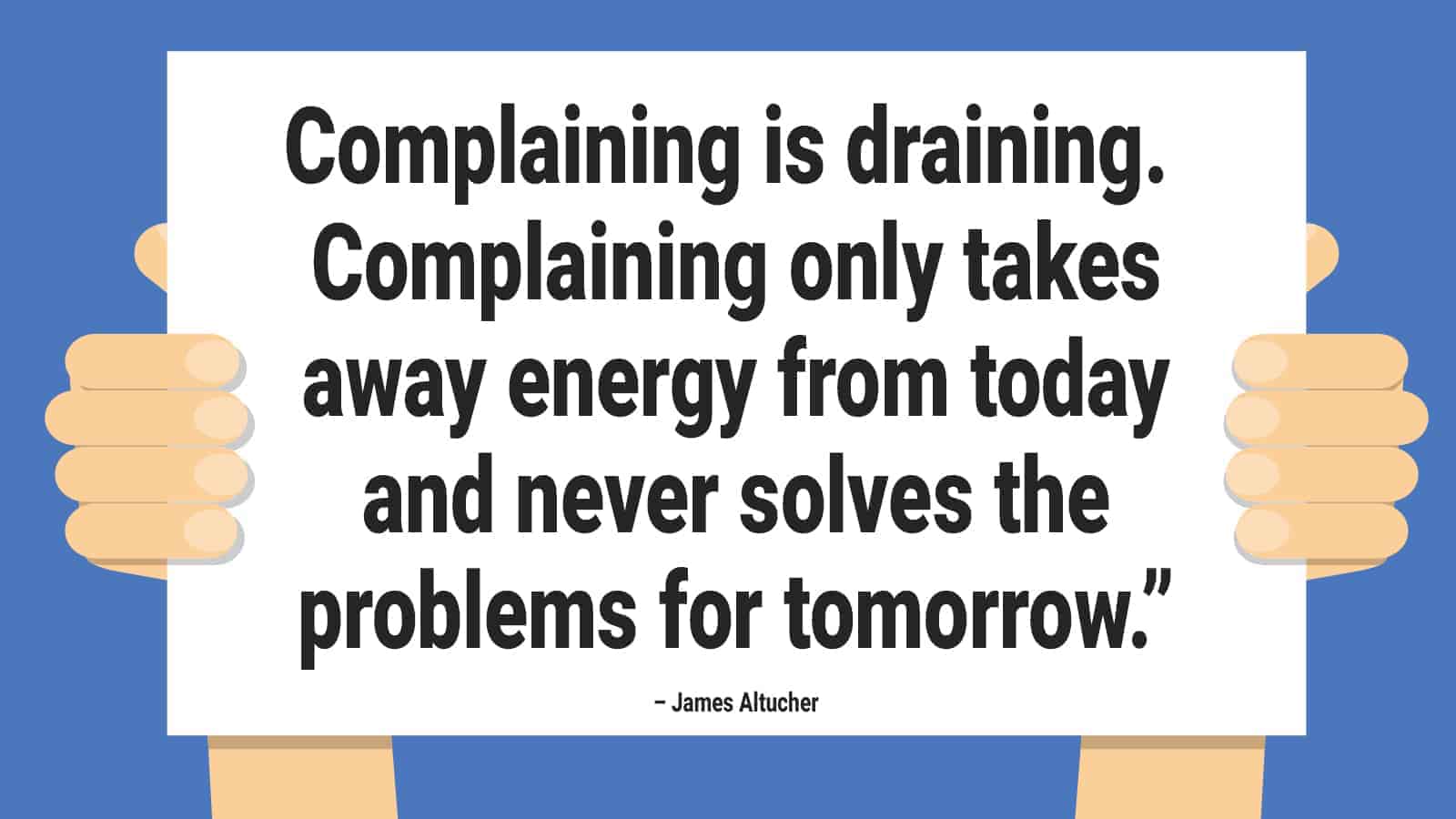If you’re like most people, you have someone in your life who’s a chronic complainer. It doesn’t matter how much you try to accommodate them kindly. They always want to air their grievances, creating a whirlwind of negativity.
Such negativity often creates a toxic environment for others. Chronic grumblers prefer to use words like “always,” “never,” or “too” in their general conversation. They say things like, “It’s always too cold here,” “I never have good luck,” or “They always do that and never think of me.”
Dealing with such attitudes can try the most patient mate, family, friend, or coworker. You’ll hear a usual list of grievances from A to Z, including past grudges. Try as you will; they’ll always find some reason to be ungrateful and petty.
Do you see some of these negative patterns in your speech and actions? Many chronic grouches often try to excuse their behavior by saying, “that’s just how I am,” or “I tell it like it is.” But what if how you are and your skewed opinions hurt you more than the supposed problems?
3 Ways Airing Grievances Causes Negative Thinking
A disgruntled attitude does much more than smother you in negativity. It can isolate you from others and rob you of any joy and hope in your life. Here are three ways that chronic complaining can affect your well-being:
 1. Complaining Affects Your Brain
1. Complaining Affects Your Brain
Your brain is the most intricate computer in the Universe. Like a mechanical operating system, it’s hardwired to keep your body running efficiently. Your daily habits register in your brain, and they create neurological paths that make these actions easier.
In other words, the more you do something, the more apt you are to repeat it. If you’re a chronic complainer, you’re programming your brain to continue the negative thoughts and actions. Your brain recognizes a pattern and makes it part of your neurological processes.
How chronic complaining affects the brain was the subject of a revealing study published by Stanford University. Researchers discovered that not only can complaining rewire your brain, but it may also shrink your hippocampus. Since this area is crucial to your intelligence and problem-solving abilities, shrinkage can be devastating.
2. Constant Grievances Attract Negative People
One of the beautiful aspects of the law of attraction is how like attracts like. The more positive affirmations you project into the Universe, the more positive results come back to you. However, this law also works on the negative side, and you draw more negativity when you are pessimistic.
Those who constantly voice their dissatisfaction will attract the same negative people into their circle. Have you ever heard the saying that misery loves company? When you grumble and grovel and rarely have anything positive to say, these people will join your chorus of woes.
Plus, negative attitudes and chronic complaining are usually a big turn-off to most people. These actions repel those who find the silver lining and enjoy expressing their gratitude. Instead, you’ll be left with like-minded people in competition to see who’s the most miserable.
Another reversal of the law of attraction is that negative affirmations create more negative actions. Comments like, “Here’s another reason why my life is rotten,” or “Nothing good ever happens to me” invites more negativity. The Universe must agree, and you’re sure to have a lifetime of aggravation and disappointment.
3. Constantly Airing Grievances Can Affect Your Physical Health
Have you ever noticed how you feel when your conversation is rife with complaints and discontentment? Not only does it suppress you mentally, but it takes a toll on your body as well. Incessant complaining can raise your stress levels and eventually affect your overall health.
According to an article published by the National Library of Medicine, chronic stress can lead to illnesses and disease. It may make you more vulnerable to vascular-cardiac disease, hypertension, diabetes, insomnia, and some forms of cancer. Although some stress is good and can’t be eliminated, undue stress is an enemy to your body, mind, and spirit.
How to Convey Your Grievances for Positive Results
You have every right to register your problems and concerns. However, how you express, it makes the difference. If you’re being mistreated or someone isn’t keeping their end of the bargain, speak up for yourself.
1. Prepare Yourself
There is a right time and place to air your grievances. It’s not in public or at a time when emotions are going haywire. Find a quiet, private place where you can have a conversation. Beforehand, take a few healing breaths and ensure that you can positively address your concerns.
2. What is the Cause of the Grievance?
Before you can solve any problem, you must define it. Having a concise definition of the issue can minimize the chances of misunderstandings. Perhaps the other person was never aware that you had a problem.
Voice your concerns clearly and calmly. Heightened emotions often thwart the problem-solving process and may make matters worse. After you’ve stated what’s on your mind, give the other person time to respond.
3. Word Choices Are Essential
Not only is it important what you say, but also how you deliver it. You won’t get anywhere with your grievances if you start into a verbal attack. The other person will automatically ignore you or become defensive.
Instead, please focus on the problem and how it makes you feel. For example, “When you invite dinner guests over and inform me at the last minute, I feel like you don’t consider me.” Or try something like, “I feel shut out of your life when we don’t have meaningful conversations.”
You’ve gotten your point across without being offensive or accusatory. In a healthy personal or professional relationship, the other party will acknowledge your feelings. You’re creating a safe environment for practical problem-solving.
 4. Suggest a Solution
4. Suggest a Solution
Do you have a pressing issue at work? While supervisors may appreciate your honest feedback, constant bellyaching only paints you in a negative light. When you come to the table with a problem, be prepared to offer a solution.
Helpful introductory phrases for this can be “what if we- “or “maybe we could.” Notice that you’re also using inclusive pronouns to make the other person feel like part of the solution. After you’ve offered your suggestions, listen to what the other person says or suggests.
5. Be an Active Listener
Frequently people sabotage the problem-solving process by not actively listening to each other. Hearing and listening are two distinct actions. While your auditory nerves allow you to hear people, listening is an active
role.
Focus on what your partner or coworker is saying. Try to mirror their emotions and use neutral, open body language. Afterward, restate what they’ve said in your own words to assure there are no misunderstandings.
6. Write Down Ideas and Suggestions
Sometimes when you are trying to solve a problem, you may forget important details about the discussions. Keeping a pen and paper handy will let you jot them down for later. It’s essential if you are problem-solving with a group of people with multiple suggestions.
7. Be Empathetic
When you are airing grievances and offering solutions, be attentive to the other person’s feelings. Maybe they have issues that you weren’t aware of that compounded the problems. Try to put yourself in the other person’s shoes and understand why they may have certain feelings and opinions.
8. Putting Ideas into Action
Now that you’ve presented your grievances and discussed them civilly, you can put suggestions to the test. Some problems may be solved immediately after the conversation. However, others may take a little time to implement changes in words or behavior.
How to Overcome Negative Thinking That Stems From Your Grievances
It’s unreasonable to expect yourself to be sunny and happy all the time. Life has unexpected twists that can bring a bevy of emotions. You may not have the ability to change some things, but you can choose how you feel about them.
1. Prioritize Your Issues
First, learn how to prioritize problems and grievances in your life. Are there some instances where you may be over-reacting? When you use discernment and address problems that matter, you won’t spend your days trying to extinguish imaginary fires.
2. Coping with the Complainer
There are some grumps in your life that you can’t altogether avoid. However, you can usually choose how you relate to them. Try to keep conversations upbeat and refuse to be drawn into their whirlpool of bitterness.
3. Practice Gratitude
When you are grateful for all your blessings, you’re less likely to act like an angry bear waken from hibernation. Consider keeping a running list of gratitude and post it where you can see it every day. Focus your conversations on your blessings and less on your problems.
 Final Thoughts on Voicing Your Grievances
Final Thoughts on Voicing Your Grievances
If you have a gripe with anyone at home or work, it’s fine to let them know how you feel. It’s much better than harboring bitterness, and you can strengthen your relationship with positive problem-solving. Resolve issues as soon as possible, so you can get back to enjoying the beautiful things in your life.
The post 3 Ways Airing Grievances Creates Negativity appeared first on Power of Positivity: Positive Thinking & Attitude.








